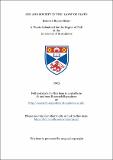Files in this item
Sex and society in the 'Laws' of Plato
Item metadata
| dc.contributor.advisor | Woolf, Greg | |
| dc.contributor.advisor | Harrison, Thomas | |
| dc.contributor.author | Moore, Kenneth R. | |
| dc.coverage.spatial | 335 p. | en_US |
| dc.date.accessioned | 2018-06-25T12:21:01Z | |
| dc.date.available | 2018-06-25T12:21:01Z | |
| dc.date.issued | 2003 | |
| dc.identifier.uri | https://hdl.handle.net/10023/14535 | |
| dc.description.abstract | This thesis deals with the topics of sex and society in the Laws of Plato with recourse to ancient historical context and modern critical theory. It examines reconstructions of ancient 'sexuality' (e.g. through Dover, Foucault and Davidson) with a view to increased clarification. The text of the Laws is considered, along with many of its literary qualities, its influences and the utopian plan that it entails. Plato's narrator, the Athenian Stranger, has proposed the remarkable theory that sexuality can be controlled through the manipulation of people's thoughts. The thesis is particularly interested in the manner in which sexuality is ideologically constructed. A significant portion of this inquiry deals with education in the hypothetical polis (Magnesia) and the part that this is designed to play specifically in terms of sex-role stereotyping. The Laws spins andreia as the ideal model for the Magnesians to imitate in their mandatory pursuit of arete. The reformulation of the Magnesian oikos and the 'brave new femininity' that this plan entails figure prominently into this examination. Magnesian women must become more like (idealised) men in terms of 'manly' enkrateia. They will combine alleged elements from athenian, Spartan, Kretan, Sauromatian and Amazonian women (plus Platonic philosophy) to attain this new status. Men must become less like women are perceived to be. A law is drafted to ban same-sex activities, considered 'womanish', but there is some uncertainty as to whether or not it will ever be enforced. Psychology and propaganda, religion, education, the family and government will all work together to affect the moral hygiene of Magnesia. The thesis investigates each of these topics, with recourse to material outside the Laws, in considering Plato's social/sexual construction theory. | en_US |
| dc.language.iso | en | en_US |
| dc.subject.lcc | PA4279.L4M7 | |
| dc.subject.lcsh | Plato.--Laws | en |
| dc.subject.lcsh | Sex--Greece--History to 1500 | en |
| dc.subject.lcsh | Sex role--Greece--History to 1500 | en |
| dc.subject.lcsh | Homosexuality--Greece--History to 1500 | en |
| dc.subject.lcsh | Greece--Social conditions--To 146 B.C | en |
| dc.title | Sex and society in the 'Laws' of Plato | en_US |
| dc.type | Thesis | en_US |
| dc.type.qualificationlevel | Doctoral | en_US |
| dc.type.qualificationname | PhD Doctor of Philosophy | en_US |
| dc.publisher.institution | The University of St Andrews | en_US |
This item appears in the following Collection(s)
Items in the St Andrews Research Repository are protected by copyright, with all rights reserved, unless otherwise indicated.

